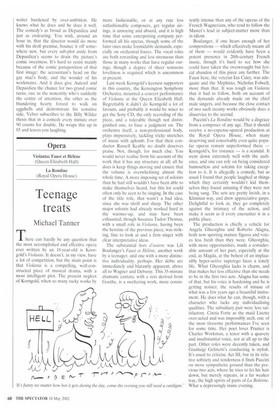Teenage treats
Michael Tanner
There can hardly be any question that the most accomplished and effective opera ever written by an 18-year-old is Korngold's Violanta. It doesn't, in my view, have a lot of competition, but the main point is that Violanta is a compelling, well-constructed piece of musical drama, with a most intelligent plot. The present neglect of Korngold, when so many tacky works by
more fashionable, or at any rate less unfashionable composers, get regular airings, is annoying and absurd, and it is high time that some enterprising company performed all his operas, though some of the later ones make formidable demands, especially on orchestral forces. The vocal roles are both rewarding and less strenuous than those in many works that have regular outings, though a degree of sheer sensuous loveliness is required which is uncommon at present.
Last week Korngold's keenest supporters in this country. the Kensington Symphony Orchestra, mounted a concert performance of Violanta at the Queen Elizabeth Hall. Regrettably it didn't do Korngold a lot of favours, and probably it would be wiser to get the Sony CD, the only recording of the piece, and a tolerable though not distinguished one, to base a judgment on. The orchestra itself, a non-professional body, plays impressively, tackling tricky stretches of music with aplomb. For that their conductor Russell Keable no doubt deserves praise. Not, though, for much else. You would never realise from his account of the work that it has any structure at all; all he does is keep things moving and ensure that the volume is overwhelming almost the whole time. A more imposing set of soloists than he had still wouldn't have been able to make themselves heard, but this lot could often only be seen to be singing. In the case of the title role, that wasn't a bad idea, since she was shrill and sharp. The other major soloists had already worked hard in the warmer-up, and may have been exhausted; though Susanna Tudor-Thomas, with a small role in Violanta, having been the heroine of the previous piece, was striking, fine to look at and a firm singer with clear interpretative ideas.
The substantial hors d'oeuvre was Lili Boulanger's Faust et Helene, another work by a teenager, and one with a more distinctive individuality, perhaps. Her debts are immediately and blatantly apparent, above all to Wagner and Debussy. This 35-minute dramatic cantata, with a text derived from Goethe, is a sweltering work, more consis
tently intense than any of the operas of the French Wagnerians, who tend to follow the Master's lead in subject-matter more than in idiom.
Boulanger, if one hears enough of her compositions — which effectively means all of them — would evidently have been a potent presence in 20th-century French music, though it's hard to see how she could have taken the overwrought but lyrical abandon of this piece any further. The Faust here, the veteran Ian Caley, was adequate and the Mephisto, Nicholas Folwell, more than that. It was tough on Violanta that it had to follow, both on account of the demands already made on the chief male singers, and because the close contact of two such steamy works obviously does a disservice to the second.
Puccini's La Rondine would be a disgrace from a composer of any age. That it should receive a no-expense-spared production at the Royal Opera House, when many deserving and conceivably even quite popular operas remain unperformed there — Korngold's, for instance — is a scandal. It went down extremely well with the audience, and one can rely on being considered humourless and solemn for taking exception to it. It is allegedly a comedy, but as usual I found that people laughed at things which they certainly wouldn't kid themselves they found amusing if they were not being sung. The sets are pretty lavish, in a Klimtian way, and drew appreciative gasps. Delightful to look at, they go completely against the intimacy of the action, and make it seem as if every encounter is in a public place.
The production is chiefly a vehicle for Angela Gheorghiu and Roberto Alagna, both now sporting mature figures and voices less fresh than they were, Gheorghiu, with more opportunities, made a considerable amount of her part, especially at the end, as Magda, at the behest of an implausibly hyper-active superego faces a lonely life. What Gheorghiu lacks is charm, and that makes her less effective than she needs to be in the first two acts. Alagna has some of that, but his voice is hardening and he is getting noisier, the results of misuse of what was a few years ago a beautiful instrument. He does what he can, though, with a character who lacks any individualising qualities. The subsidiary pair were less satisfactory. Cinzia Forte as the maid Lisette over-acted and was impossibly arch, one of the most tiresome performances I've seen for some time. Her poet lover Prunier is Charles Workman, a tenor with a quavery and insubstantial voice, not at all up to the part. Other roles were decently taken, and Gianluigi Gelmetti's conducting is stylish. It's usual to criticise Act Ill, but in its relative sobriety and tenderness it finds Puccini on more sympathetic ground than the previous two acts, where he tries to let his hair down, but merely repeats, in a far weaker way, the high spirits of parts of La Boheme. What a depressingly inane evening.














































































 Previous page
Previous page